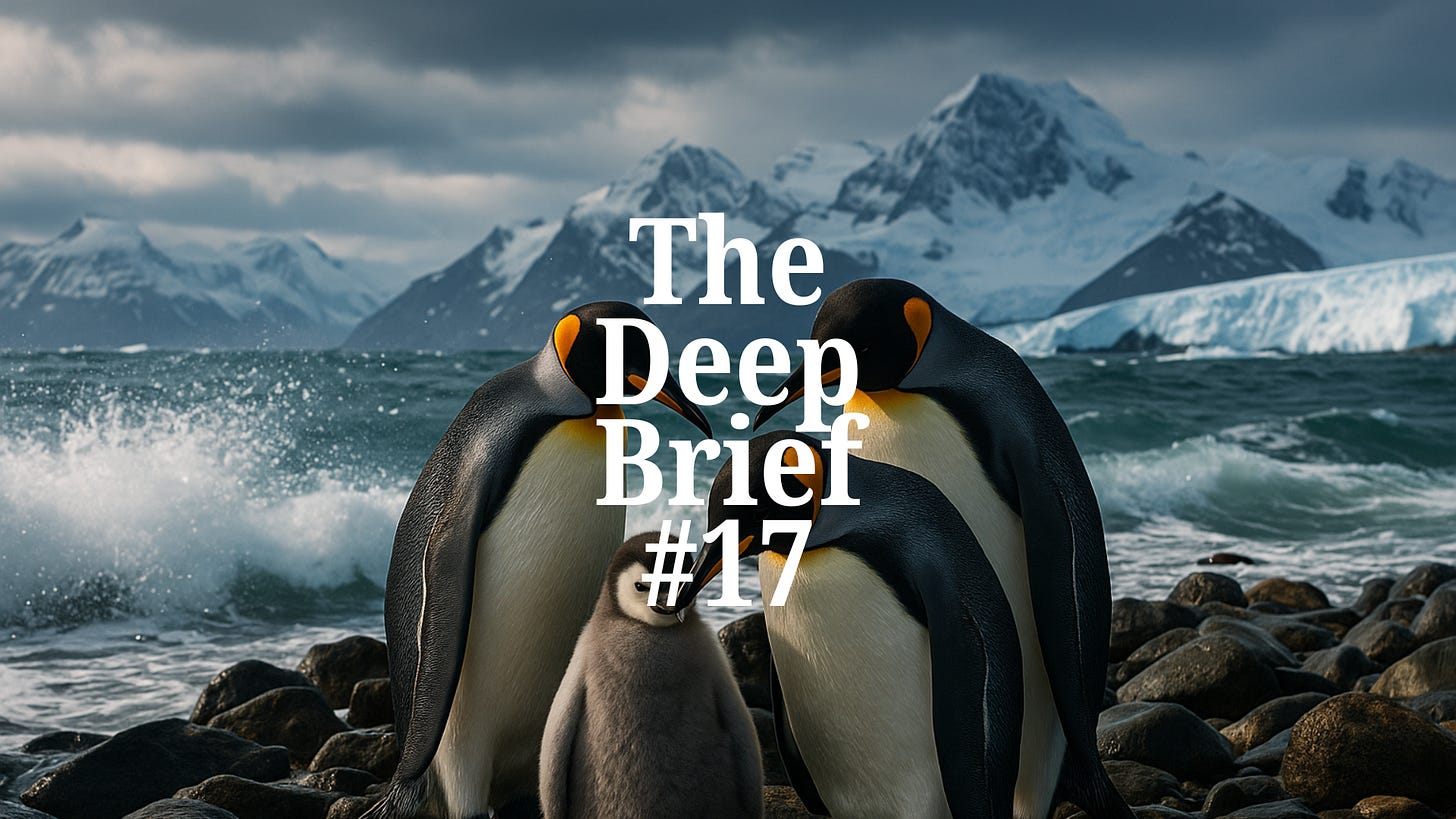The Deep Brief #17 | 25 October 2025
Your end-of-week ocean intelligence, built to inform, agitate, and equip you
The ocean is shifting beneath our feet.
Glaciers are retreating, penguins are pushed beyond their limits, and the Southern Ocean is beginning to lose its breath. Together, these stories reveal more than isolated events. They mark a system under strain, struggling to hold the balance that makes life on Earth possible.
This week’s Deep Brief connects the science, the species, and the signals of change that rarely make headlines but could define the century ahead.
Three deep dives. Three quick hits. One hard truth from the sea.
Deep Dives
Penguins are facing a pile-up of climate shocks.
A sweeping new analysis across all penguin species reveals that they are being hit by overlapping extremes such as heatwaves, cyclones, sea-ice collapse, and food-chain disruption. The study identifies African, Emperor, Adélie, Snares, and Galápagos penguins as most at risk, with “climate collision zones” where multiple stressors converge. Conservation policies still treat threats as separate. The science says they now act together.
👉 Explore the full study here →
Retreating glaciers may starve coastal seas of vital nutrients.
A new study from the Scripps Institution of Oceanography has found that meltwater from rapidly retreating glaciers contains fewer bioavailable nutrients than melt from stable ones. As glaciers shrink and lose contact with rock, the chemical reactions that release iron and manganese, elements that fuel ocean life, slow dramatically. The loss of glacial nutrient input could weaken productivity from fjord ecosystems to the global carbon cycle.
The Southern Ocean’s carbon sink is more fragile than we thought.
New findings published in Nature Climate Change reveal that the Southern Ocean’s ability to absorb carbon dioxide has not yet collapsed, although it may be living on borrowed time. A fresh layer at the surface has trapped carbon-rich deep water below 200 metres, temporarily enhancing carbon storage. That same stratification means less mixing, fewer nutrients, and lower oxygen levels. Once winds shift or the balance weakens, the stored carbon could surge back into the atmosphere.
Three Quick Hits
Pacific activists confront deep-sea mining vessel.
In the Cook Islands, Pacific campaigners in kayaks surrounded the US-operated exploration ship Nautilus, demanding an end to deep-sea mining trials. More than 40 nations now support a moratorium or pause.
See how the protest unfolded →
Microplastics may linger at the ocean surface for a century.
A new model shows how sticky sediment particles trap microplastics near the surface, preventing them from sinking for up to 100 years and increasing exposure for plankton, seabirds, and fish larvae.
WHOI launches historic £500 million campaign for ocean discovery.
The Woods Hole Oceanographic Institution has announced the largest philanthropic drive in its history, a £500 million campaign to expand exploration, solutions science, and next-generation ocean training.
Learn more about the campaign →
One Hard Truth
The Southern Ocean is holding its breath, and it cannot do so forever.
For centuries, the Southern Ocean has been Earth’s greatest ally. It absorbs more carbon dioxide than any other ocean basin and regulates half the planet’s heat exchange. It is the planet’s lungs.
That system is now faltering. The new Nature Climate Change analysis shows the surface layer has freshened so much that it is forming a cap, a thin film between worlds. It traps carbon below, which buys us time, yet it also seals off nutrients from rising, starving life above. Oxygen is declining. Productivity is slipping.
The paradox is cruel: the very process that keeps our climate stable could soon suffocate the ocean that sustains it.
If the Southern Ocean exhales, if winds or currents flip, centuries of stored carbon could vent back into the atmosphere. The effect would be like removing a planetary filter in one breath.
This is the real planetary boundary breach. It is not a tipping point we are approaching in the future but a slow unravelling that has already begun.
Final Thought
Penguins under pressure. Glaciers losing their chemistry. Activists in kayaks fighting an old industrial story. The Southern Ocean, silent and strained, still doing the heavy lifting of a species that refuses to slow down. These are not scattered stories. They are connected symptoms of the same imbalance, a planet overdrawn on every account.
The ocean continues to buffer us. It still feeds, cools, and stabilises the systems that make life possible. Its strength is not infinite. The signs of fatigue are everywhere. If a penguin’s breeding success can forecast ecosystem collapse, and if the most remote ocean on Earth is running out of breath, the message is clear. The future of human comfort is inseparable from the ocean’s capacity to endure discomfort.
If this briefing helped you see the ocean differently, consider becoming a paid subscriber. It keeps this work independent, evidence-based, and free for everyone who needs to know what is happening beneath the surface.
The sea has no voice of its own. It needs ours.
Thank you to every Founding Member and paid subscriber who keeps this possible.
See you next week.
- Luke




Grateful for your focus on this. Awareness leads to action. It’s the only thing that does.
¿ Do u consume any amimal products ? If so, u r harming the oceans. And the whole planet.